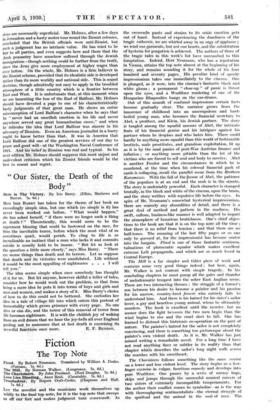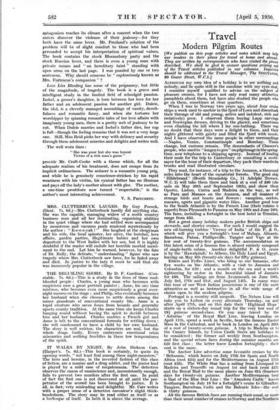Fiction
The Top Note
Flood. By Robert Neumann. Translated by William A. Drake. (Putnam. 7s. 6d.) 7s. fkL) LET the novelist and the musicians work themselves up wildly to the final top note, for it is the top note that sweeps us of our feet- and makes judgment turn somersault. As the crescendo pants and strains to its crisis emotion gets out of hand. Instead • of experiencing the dumbness of the tragic entlaarsis, we are whirled away in an orgy of applause ; we rendour garments, butnot our hearts,*and the substitution 'of hysteria for purgation is achieved. The authors of three of the tragic tales in this. week's list have succumbed to this temptation. Indeed, Herr Neumann, who has a reputation in Vienna, attains the top note almost at the beginning of his storY, and, remains sounding it for the whole of his four hundred- and seventy pages. His peculiar kind of speedy impressionism takes one immediately to the cinema. One is plunged; as it were, into the cinema's. fantastic black and White gloom ; a permanent " close-up " Of panic is thrust upon the eyes, and a Wurlitzer rendering of one of the Hungarian Rhapsodies bangs on the *ear-drums.
- Out of this assault of confused -impressions certain facts become gradually clear. The narrator grews from the innocence of childhood into an unscrupulous and hard- boiled young man, who becomes the financial secretary to Abel, a profiteer, and Klein, his Jewish partner, The story is tangled among the squalid amours of Abel, the intricate feats of his financial genius and his intrigues against his partner whom he despises and- who hates him. There could hardly be anything more squalid than this-World of-fashionable brothels, male prostitutes, and grandiose exploitation, lit up as it is by the mad panics of post-War Austrian finance and inflation ; or anything more - pitiable than the lot of the Victims who are forced to sell soul and body to survive. Abel is another Feodor and the circumstances in which he is murdered, at the time when his colossal financial pack of cards is collapsing, recall the parallel scene from the Brothers Karamazov. With the fall of the [house of Abel, the patience of the populace is at an end and the mob is in the streets. The story is undeniably powerful. Each character is stamped brutally, in the black and white of the cinema, upon the brain, and-the story writhes with repulsive life before the eyes. In spite of Mr. Neumann's somewhat hysterical impressionism, there are scarcely any absurdities of detail, and there is a great deal of method and pattern in the madness. His swift, callous, business-like manner is well -adapted to impart the atmosphere of luxurious brutishness. One's chief objec- tions to the book are that it is on the top note all the time ; that there is no relief from tension ; and that there are no half-tones. The meaning of the last fifty pages or so can only be guessed at, for the impressionist has become orator into the bargain. Flood is one of those fantastic sentimen. talizations of plutocratic squalor which makes excellent extreme Left propaganda, and which are so much loved in Central Europe. - The Mill is a far simpler and tidier piece of work and contains some very good things indeed ; but here, again, Mr. Walker is not content with simple tragedy. In his concluding chapters he must pump all the gales and thunder of melodramatic tempest into the sober East Anglian scene. There are two interacting themes : the struggle of a farmer's son between his desire-to become a painter and his passion for his narrow, country-bred fiance who _entirely fails to understand him. And there is his hatred for his sister's sailor lover, a gay and heartless young animal, whom .he ultimately murders.. The book is *excellent until-the:murder, but no sooner does the fight beoween the two men begin than the wind begins to rise and the cruel sleet to fall. One has learned to distrust this histrionic co-operation on the part of nature. The painter's hatred for the sailor is not completely convincing, .and there is something too picturesque about the painter's own violent death. As it is, Mr. Walker has just missed writing a remarkable novel. For a long time* I have not read anything finer or subtler in its reality than that chapter which describes the sailor's long night walk across the marshes with his sweetheart.
The Charioteers follows something like the same course on a lower and less violent level. The story begins 'as a five- finger exercise in vulgar, facetious comedy and develops into pure Wurlitzer. One passes by a series of uneasy hops, skips and- jumps through the successful musical careers of two sisters of extremely incompatible temperaments. For the author their conflict comes to symbolize—as is the way with thoroughgoing sentimentalists—the eternal struggle of the spiritual and the animal in the soul of man. The antagonism reaches its elimax after .a concert when the two sisters discover the violence of their jealousy—for they both have the same lover. Mr. Presland's solution of the probleta. will be of slight comfort to those who had been persuaded to accept his interpretation of spiritual values. The book contains the stock Bloomsbury party and the stock Rusgan lover, and there is even a young man with private means and " an hereditary taint " standing with open arms_, on the last page. I was piizzled by one or two sentences. Why should someone be " euphonitiusly known as Mrs. Foitetede's conmaniOn " Love Lies Bleeding has some of the poignancy, but little of the . magnitude, of tragedy. The book is a grave and intelligent :study in the limited field. of schoolgirl passion. Isobel, a grocer's daughter, is torn between her love for her father and an adolescent passion for another girl. Dulcie, the idol, is a cleverly managed assemblage of vanity, deceit- fulness and romantic fancy, and when she tortures her worshipper by spinning romantic tales of her love affairs with imaginary young men, there is a pretty web of jealousy to be cut. When Dulcie marries and Isobel's father dies, her cup is full—though the feeling remains that it was not a very large one. Still, Miss Reid picks her way with delicacy and security through these adolescent miseries and delights and writes well.
The well worn lines : " She was poor but she was honest Victim of a rich man's game " provide Mr. Croft-Cooke with a theme which, for all the adequate realism of his treatment, does not escape from its implicit ordinariness. The seducer is a romantic young prig, and while he is genuinely conscience-stricken by his rapid weariness with his victim, his cynical father has no illusions and pays off the lady's mother almost with glee. The mother, a one-time prostitute now turned " respectable," is the author's most interesting achievement. - V. S., PurrcnErr.











































 Previous page
Previous page